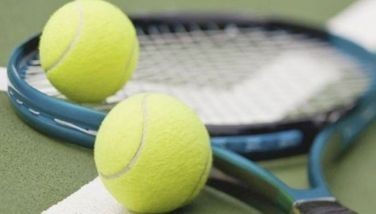Arnis in the eyes of the world
The Bostik World Arnis Open (WAO) currently on-going at the SM Fairview Annex got an unexpected boost when one of its guests turned out to be a European filmmaker doing a documentary on the sport. He also shared many similar experiences from his home country.
Swiss actor Andy Kunz has been traveling around the country for over a year, tracking down fighters for a documentary and a planned action movie he will be producing.
“There aren’t many action movies in Switzerland,” says Kunz, a practicing grandmaster in different martial arts. “All the action movies come from America. I also noticed that there are no movies about Filipino fighters in arnis. There are films about muaythai, kickboxing and other martial arts.”
Kunz is one of several foreign participants in the Bostik World Arnis Open, along with other contenders like Andrea Rollo of Italy, Julio Felices of Germany and Greg Sanger from Germany. Three weeks ago, a small contingent from France planed into the Philippines to get some last-minute training from local grandmasters in the hope of snagging their first-ever WAO medal. Teams from the US and other countries are trying their luck in the tournament.
Kunz has been able to cast an objective eye to the fractured arnis community in the Philippines, and it brought to his mind Switzerland’s failed bid to have kickboxing included in the Olympic Games.
“The committees from the Olympics came to Switzerland, but people were saying bad things about each other,” the one-man production team reveals. “When I would do my Swiss championships in June, all five associations would do their championships in June. You have no fighters, no audience, and nobody makes money. It’s so stupid. If one of us did it in May, then the other June, then the other August, everybody would make money. They could join my tournament, I could join their tournament. I feel sorry about that.”
Locally, that is a familiar refrain.
“We can work together, and everything will work out,” says Grandmaster Frank Aychoco of Aychoco Martial Arts Center in Novaliches, who is hosting some foreign participants in the WAO. “It’s not a question of styles. It’s a question of skill. The foreign athletes are willing to travel so far and stay anywhere because they love the sport.”
Sadly, throughout the history of arnis up to today, disunity has been a recurring theme. Even in places like Italy, Filipino martial artists have their differences, and it gets in the way of the growth of the sport. But that is not the case in the Bostik WAO. Almost 300 participants flocked to SM Fairview yesterday just for the “anyo” (forms) competition. Yesterday’s initial tally for the sparring competition, which begins today, showed that total participation will exceed 400 entries, breaking last year’s record. And that is even without the participation of the large Philippine Air Force contingent, which is preparing for the AFP Challenge this coming week. Valenzuela, a perennial powerhouse with a very active stickfighting community, fielded a whopping 75 entries. Fighters came from as far as Cagayan de Oro, Iloilo and Bulacan.
A common sentiment among grandmasters and instructors is that, instead of debating over whose style is the right style or who is original, participation should be the focus. This is the way sports should be, without politics that holds it back.
* * * *
Aside from the problems caused by inconsistencies in judging at the Southeast Asian Games, there are other minor irritants that hinder visiting athletes physically or mentally. To begin with, despite the oppressive heat and abundance of dust in Palembang, air-conditioned buses are only provided large groups moving from the athletes village to their respective venues. Individual athletes and officials or small groups have to bear with oven-like minivans or pedicabs. Many of them wind up having swallowed red dirt and worked up a sweat by the time they get to their venue.
Event schedules change at the drop of a hat, both in Jakarta and Palembang. Last Thursday, our men’s basketball game schedule was changed on the day of the game. In other sports, they rearrange the schedule allegedly to give the host country and a couple of others an opportunity to see who is leading at that point, and see how they can manipulate the standings. Sometimes, a strategic loss against a neutral country can boot out a contender, especially since the winner-over-the-other rule applies. In other sports like petanque, the morning games sometimes started half an hour earlier than scheduled. The afternoon games are announced to start at 2 p.m., and are later revealed to start at 1:30 p.m.
This constant confusion is a contributing factor to the Philippines’ underwhelming performance in Indonesia. This writer cautiously predicted that we would finish fifth overall. At this rate, we are struggling just to reach that rank.
- Latest
- Trending































